Actually, Rudy Giuliani Has Always Been Like This
Pundits wondering what has happened to America's Mayor have conveniently forgotten his history of racism and contempt for the poor.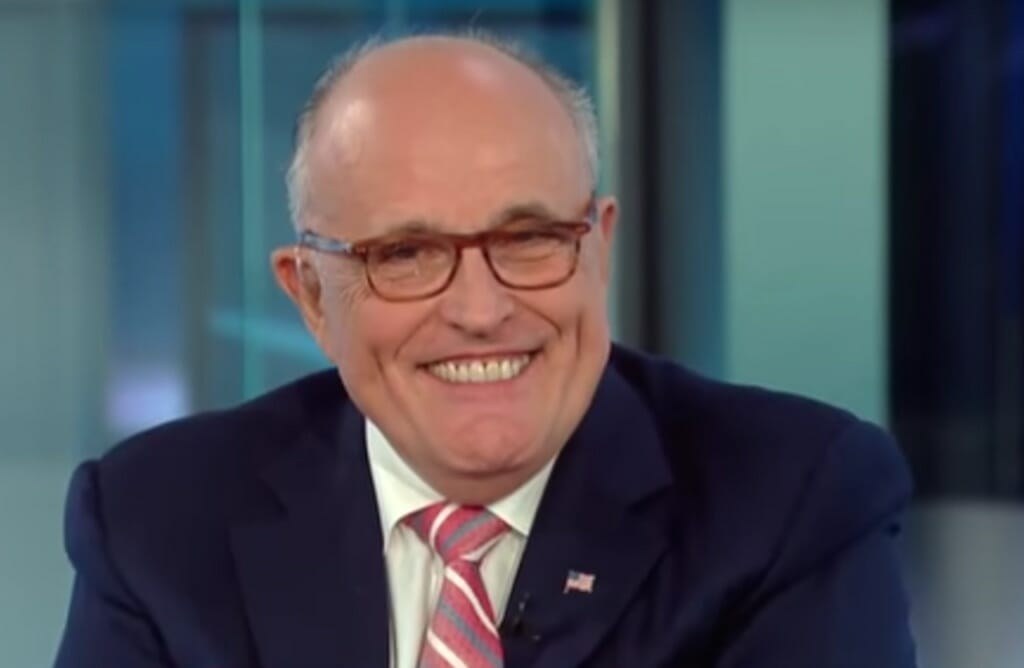 Rudy Giuliani. (YouTube)
Rudy Giuliani. (YouTube)
“I will be the hero! These morons—when this is over, I will be the hero…. Anything I did should be praised.”
These are the words of President Donald Trump’s personal lawyer, Rudy Giuliani, speaking of the government operative who leaked information about the president’s conversations with the Ukrainian president that has led to impeachment proceedings. Out of context, they appear to be narcissistic ravings. In context, they are just another installment of the constant refrain Americans are used to hearing from the president’s lead defender. No matter how unhinged Giuliani sounds in one interview, the cameras go back to him again and again.
The regular media meltdowns have almost become a real-time comedy for US news consumers, although it has all taken a serious turn. He’s now the focus of the impeachment probes as well; two of his associates were recently arrested.
US media are asking: How could this happen? How did a two-term mayor of a major city, previously a famous federal prosecutor, and someone thought to be a future president, once lauded for reducing crime in New York City and serving as a rallying figure after the World Trade Center attacks, turn into such a primetime clown of the Trump era? How could a crime fighter become the center of criminal intrigue?
In the New York Times (10/7/19), a former Giuliani mayoral campaign operative asked “what happened” to the former mayor, recalling a brave man who took on a powerful Democratic Party and a broken city, citing his successes in “reducing crime, improving the quality of life and reforming welfare as mayor.”
The New York Daily News editorial board (9/28/19) sharply posed several questions to Giuliani as Trump’s personal lawyer, but not before lauding him:
What’s really impossible is recognizing this Rudy as the man we once admired, first as a US attorney who dismantled the mob, then as a mayor who drove down crime, rescued a suffering city from decline and led us through our darkest days on 9/11 and its aftermath.

Max Boot (Washington Post, 5/4/18) claimed that “Giuliani, more than any other individual, made New York what it is today: one of the safest, richest and most dynamic cities in the world.”
Even before the election of Donald Trump, Bloomberg columnist Albert Hunt (10/4/16) lamented that the ex-mayor’s sycophancy for Trump overshadowed how “he once captivated Americans with his take-charge leadership after the terrorist attacks of September 11.” Hardcore neoconservative and “never Trump” Republican Max Boot, in the Washington Post (5/4/18) last year, listed Giuliani as one of the comrades he had “admired and respected” who had “failed the Trump test.”
It seems like so much of the media cannot square the Giuliani of today with the towering figure of the 1980s and ’90s. But Jeffrey Toobin of the New Yorker (9/3/18) pulled it together:
As mayor, he was the law-and-order leader who kicked “squeegee men” off the streets of New York. Now he’s a talking head spouting nonsense on cable news. But this version of Giuliani isn’t new; Trump has merely tapped into tendencies that have been evident all along. Trump learned about law and politics from his mentor Roy Cohn, the notorious sidekick to Joseph McCarthy who, as a lawyer in New York, became a legendary brawler and used the media to bash adversaries. In the early months of his presidency, as Mueller’s investigation was getting under way, Trump is said to have raged, “Where’s my Roy Cohn?” In Giuliani, the president has found him.
For New York City reporters who covered Giuliani’s operatic mayoralty, the Giuliani who famously claimed in defense of Trump that “truth isn’t truth” hasn’t changed so much.
Robert Polner—who covered the mayor for Newsday and edited a book on Giuliani, America’s Mayor, America’s President?—told FAIR that “you’re seeing a more extreme version of what he was doing as mayor,” a politician who was obsessed with being the center of the media’s attention and who stoked racial tension for political advantage.
To show just how petulant and petty Giuliani could be as mayor, consider this: He attempted to force the Grammy Award ceremony out of New York City due to a dispute with its organizers over whether he’d be the one to read a list of the nominees. In 2000, he announced at a press conference that he was leaving his wife, Donna Hanover, before telling her of his divorce plans. Giuliani pushed out his police commissioner, Bill Bratton, not because he was failing to implement the mayor’s anti-crime agenda, but because Bratton was stealing the media spotlight from Giuliani. Noted Polner:
There was always a side of Rudy that was overreaching, hyperbolic, throwing punches in order to control the media narrative of that day or that work or out of pettiness, or as he would say, rein in the liberal city.
Giuliani was famously gruff with the media during press conferences, painting them as part of the effete liberal class he was fighting against, foreshadowing Trump’s current campaign against the press.
But it isn’t just mere theatrics that unite Trump and Giuliani; it’s also political substance. While many Republicans ally themselves with the president for political expedience, the president and the former mayor share an obsession with “law and order,” a focus on militarized policing as the solution to racialized fears of crime, and a tendency toward a more fascistic section of the right than the rest of the Republican Party.
Some saw that early on. The late Jimmy Breslin likened Giuliani to Benito Mussolini, calling him “a small man in search of a balcony.” The Daily Show’s first host, Craig Kilborn, routinely called him “Benito Giuliani.”
Polner pointed to another connection between the former mayor and the current president:
Giuliani was really focused on his base, and he never got beyond that. He could have reached out the black community, but never did, and used them to appeal to the base of white ethnics. He alienated blacks, he alienated Haitians, he alienated Latinos.
Giuliani’s fierce “anti-crime” agenda resulted in what many consider to be a reign of anti-black police terror, marked by the wrongful deaths of black men like Patrick Dorismond and Amadou Diallo, and the brutal beating and violation of Abner Louima by police officers.
Polner also questioned Giuliani should be credited with other victories, like reducing homelessness or reforming welfare, as pieces like the Times op-ed (10/7/19) did. These reforms resulted in things like homeless people being arrested. On welfare reform, while Giuliani cut the city’s welfare rolls in half, welfare advocates argued that this forced the next mayor, Michael Bloomberg, to inherit a ballooning poverty increase.
“It was done without too much thought to the human impact,” he said.
The racial animus Trump has for Latino immigrants, for example, echoes Giuliani’s racist politics, in which he consistently dismissed black anger over police violence. “The patronizing talk is similar,” Polner said. “He had no black support, and he didn’t seem to care.”
A great deal of this gets forgotten, since Giuliani was heralded as a hero when the United States was desperately looking for one after the WTC attacks—despite the fact that his actions on the day of the attacks contributed to the deaths of emergency responders, and his insistence that the air at Ground Zero was safe to breathe without filtration no doubt led to the deaths of many more (Extra!, 11–12/06, 5–6/07). He was also credited with a drop in crime, which allowed capital to return to the city—though the decline in the city’s crime began in 1990, three years before Giuliani took office, and paralleled similar declines in violence in other large cities (FAIR.org, 8/20/13, 12/3/14). Both these myths helped establish his image nationally.
“Giuliani’s behavior now reminds people of his divisiveness,” Polner said. But “New Yorkers cast a knowing eye on his antics on Fox…. They know how vicious he can be.”
Your support matters…Independent journalism is under threat and overshadowed by heavily funded mainstream media.
You can help level the playing field. Become a member.
Your tax-deductible contribution keeps us digging beneath the headlines to give you thought-provoking, investigative reporting and analysis that unearths what's really happening- without compromise.
Give today to support our courageous, independent journalists.

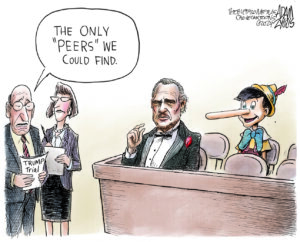

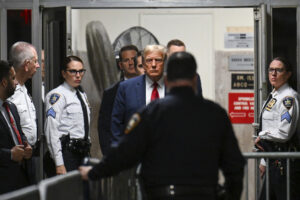
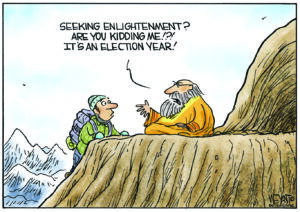
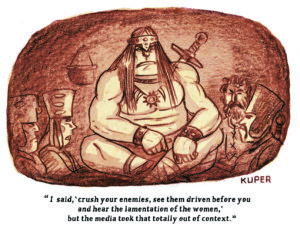
You need to be a supporter to comment.
There are currently no responses to this article.
Be the first to respond.